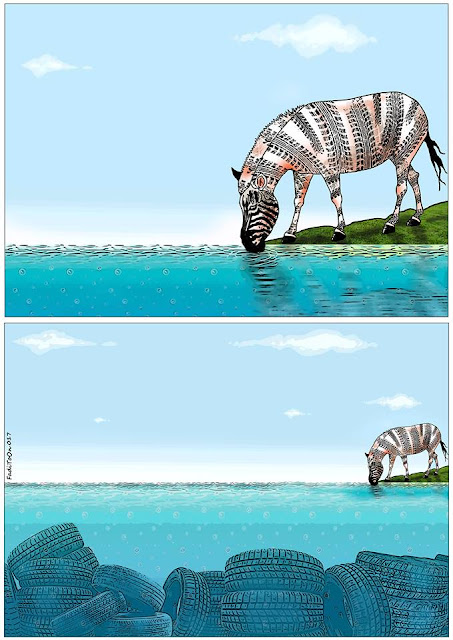Opinion vs. quality of art
Last week Steve Brodner called to an important recognition:
"I think it's time to separate the issues of opinion vs. quality of art. I am more pissed at the form than the content. And that's because with muddled form you have no idea what the content is".
We must discuss Riss' drawing like any other cartoon, Steve was stressing, seeing cartooning is his art, his own constant battle at "fine-tuning the communication of the cartoon".
To say it as it was, it was not a good drawing and at face value it seemed directed at the corruption of the child growing up rather than our standards being corrupted at all time. The idea was muddled. It wanted to tell too much and the composition turned out equally poor. This is a drawing screaming of intentions not reached, however noble they may have been in the first place.
A little string of counter cartoons emerged in its aftermath on alternative futures for Aylan, each of them stressing his moral exemplary standing as a toddler and adult alike. Not great art for the most part, but they were ripostes and they did their job.
 |
| Per Marquard Otzen, January 14, 2016. |
The best of the lot was to me the one, which made much the same type of comment as Riss did on the EU-reluctance to take on the responsibility towards the refugees, in this case in his own words:
"I will not speculate, whether children are traumatized and their lives and their survival jeopardized by restricting the access to family reunification from one to three years. I am not a psychologist."Per Marquard Otzen specifically leaves Aylan as he has been iconized; this is not a finger pointed towards neither the toddler nor his fellow refugees. This is a reaction to the situation the political field in Europe has left us all in and he as a cartoonist takes responsibility by feigning his refusal to take responsibility. He must leave the scene.
Visibly leaving a scene, which is an icon in Per Marquard Otzen's work; Freud's office and its layers upon layers of the richness of human life, while being a place for scrutiny on the wayward ways of those same humans. Which very much sums up the job description of the cartoonist.
Steve Brodner concluded that Riss' cartoon directed the interest back to Charlie Hebdo itself rather than the issue at hand. In Per Marquand Otzen's case the cartoon has checked out from the daily in the foreground in which it was printed.
The cartoon shown is courtesy of Per Marquard Otzen and must not be reproduced without his permission.

